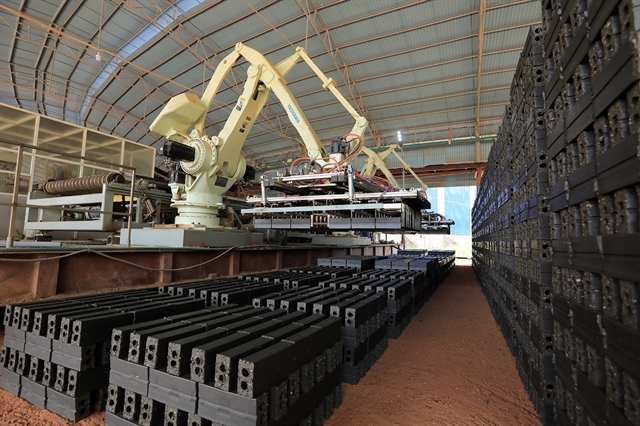 Economy
Economy

 |
| Prime Minister Phạm Minh Chính chairs the conference on construction materials on Saturday. — VNA/VNS Photo Dương Giang |
HÀ NỘI – Prime Minister Phạm Minh Chính on June 15 required restructuring in terms of organisation, administration, finance, and input materials at enterprises in the construction materials industry towards sustainable development.
Addressing an online conference on removing difficulties in, promoting production and consumption of cement, iron and steel and other construction materials, PM Chính underlined that the industry is facing difficulties from rising fuel costs, a shortage of raw materials for production, environmental protection pressure, and problems in policy mechanisms, markets, and financial situation.
In order for the sector to develop sustainably, promote efficiency, and make important contributions to socio-economic development, Chính said it is essential to effectively implement the national construction materials development strategy for the 2021 – 2030 period, with a vision to 2050, and the master plan on exploration, exploitation, processing, and use of mineral resources for the 2021 – 2030 period, with a vision to 2050, together with speeding up the pace of public investment and infrastructure projects, including the scheme on building one million social housing apartments.
He also noted the need to apply scientific, technological and management achievements, especially the fourth Industrial Revolution, in production; improve product quality; and diversify high quality products with high economic value to meet construction needs.
At the same time, it is important to economically and efficiently use resources; save energy, raw materials and fuel in production; maximise use of waste from industries for the production process; and minimise impact on the environment, Chính said.
The Government leader urged improvement of the capacity to forecast domestic and foreign influence factors so as to make proactive and timely responses and support enterprises in stabilising their production and expanding markets.
Attention should be paid to seeking ways to reduce imports, improve product quality, cut down costs, and increase the competitiveness of domestic products, he added.
According to the Ministry of Construction, in the last 10 years, Việt Nam's total production capacity of key construction materials has grown to about 120 million tonnes of cement, 830 million square metres of tiles, 26 million ceramic sanitary ware products, 330 million square metres of construction glass, 20 billion fired clay bricks, and 12 billion unburnt bricks each year.
The quality of Vietnamese construction materials has met international standards. The level of technology, and production and business organisation of the industry ranks among the top in the Association of Southeast Asian Nations (ASEAN). The total annual revenue is estimated at nearly US$47 billion, accounting for about 11 per cent of national GDP.
However, in recent years, the country's construction materials industry has encountered many difficulties, such as decreases in consumption and revenue leading to stagnation production and business activities, loss of jobs, thus affecting socio-economic development of the nation. — VNS




